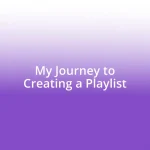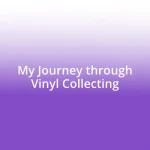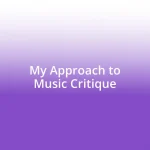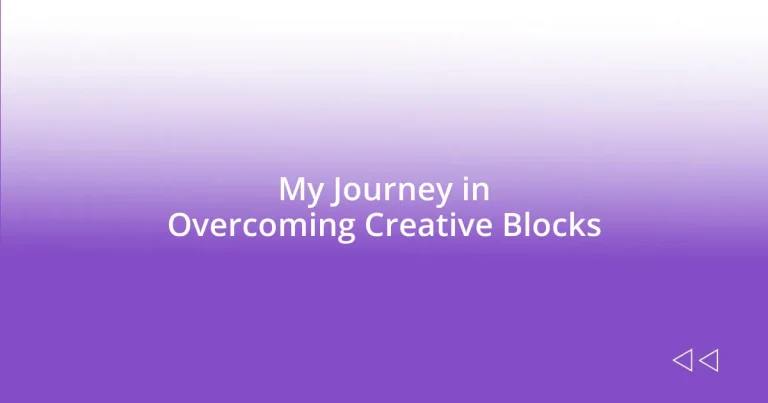Key takeaways:
- Creative blocks often stem from fear, self-doubt, and stress, highlighting the need for self-awareness to overcome them.
- Techniques like timed work sessions, changing environments, and engaging in other creative hobbies can effectively break down mental barriers.
- Building a consistent routine, finding peak creativity times, and leveraging community support are essential for nurturing creativity.
- Reflecting on past work helps track progress and reignites confidence, reinforcing the connection between growth and creativity.
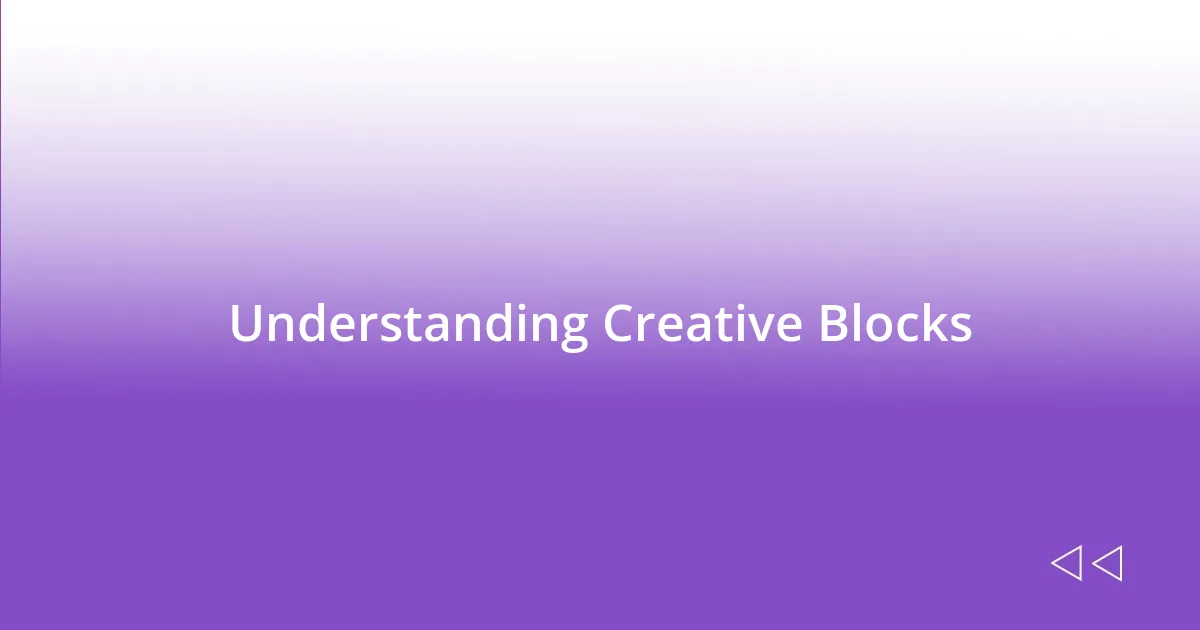
Understanding Creative Blocks
Creative blocks can often feel like an invisible wall, one that sneaks up on you when inspiration is most needed. I remember sitting in front of my canvas, brush in hand, and feeling utterly paralyzed, as if the colors of my thoughts had faded away. Have you ever experienced that heavy silence in your mind, where ideas should be dancing around but all you hear is crickets?
Sometimes, these blocks stem from fear—fear of not being good enough or fear of judgment. In my own experience, I often found myself comparing my work to that of others, spiraling into self-doubt. Isn’t it interesting how the pursuit of creativity can lead to these unexpected crises of confidence? When we let that quiet voice of comparison take the stage, it drowns out our unique voices.
It’s also crucial to understand that creative blocks don’t just pop up randomly; they often signal underlying emotions or stressors. I once had a period where the pressures of life were weighing heavily on my shoulders, and I realized that my lack of creativity was a reflection of that stress. Have you ever noticed that your best ideas flow when you’re relaxed and in a positive state of mind? Recognizing this connection can be a powerful first step in overcoming creative blocks.
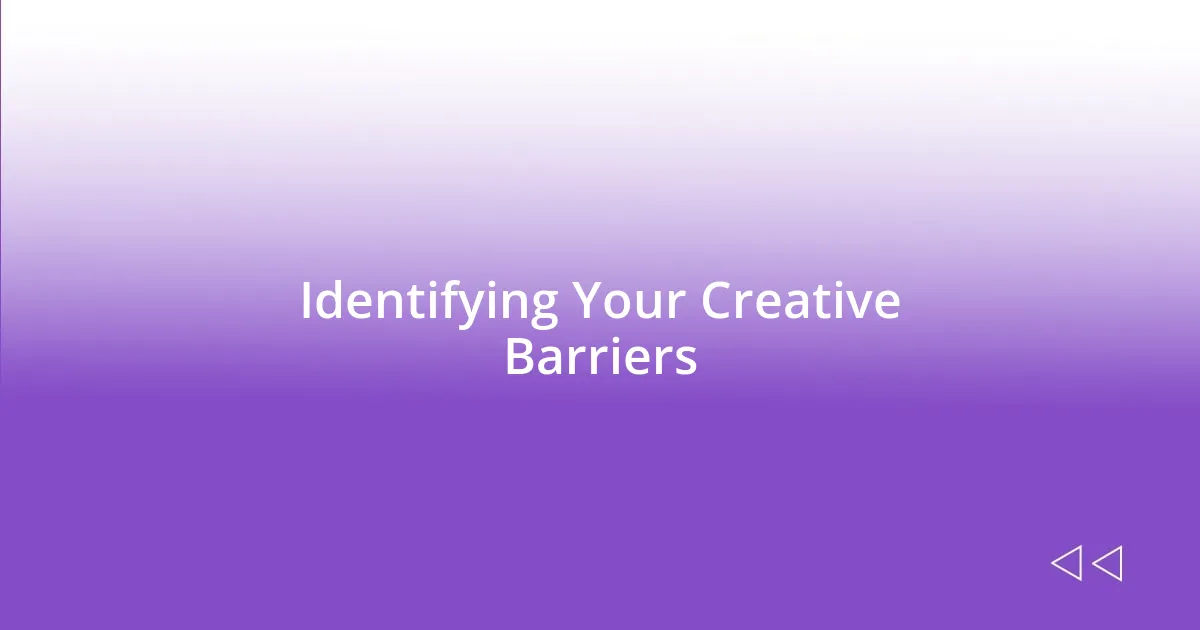
Identifying Your Creative Barriers
Identifying the barriers standing between you and your creative flow is an intimate journey. I recall a time when I thought the issue was purely a lack of inspiration, but digging deeper revealed my fear of vulnerability. I realized that sharing my work with others made me anxious about their perceptions, blocking my creativity unintentionally. Unearthing these feelings can be a game-changer.
Consider the following key barriers that might be impacting your creative process:
- Self-Doubt: It can creep in when you compare your work to others, making you question your abilities.
- Fear of Judgment: Worrying about how others will perceive your ideas may cause hesitation to express yourself.
- Perfectionism: Striving for an unattainable standard can lead to paralysis instead of progress.
- Stress and Anxiety: Real-life pressures can cloud your mind and block the flow of ideas.
- Lack of Time: When life gets busy, creativity often takes a backseat, leading to frustration and disconnection from your passions.
Acknowledging these barriers is the first step to breaking them down, allowing the light of creativity to shine through.
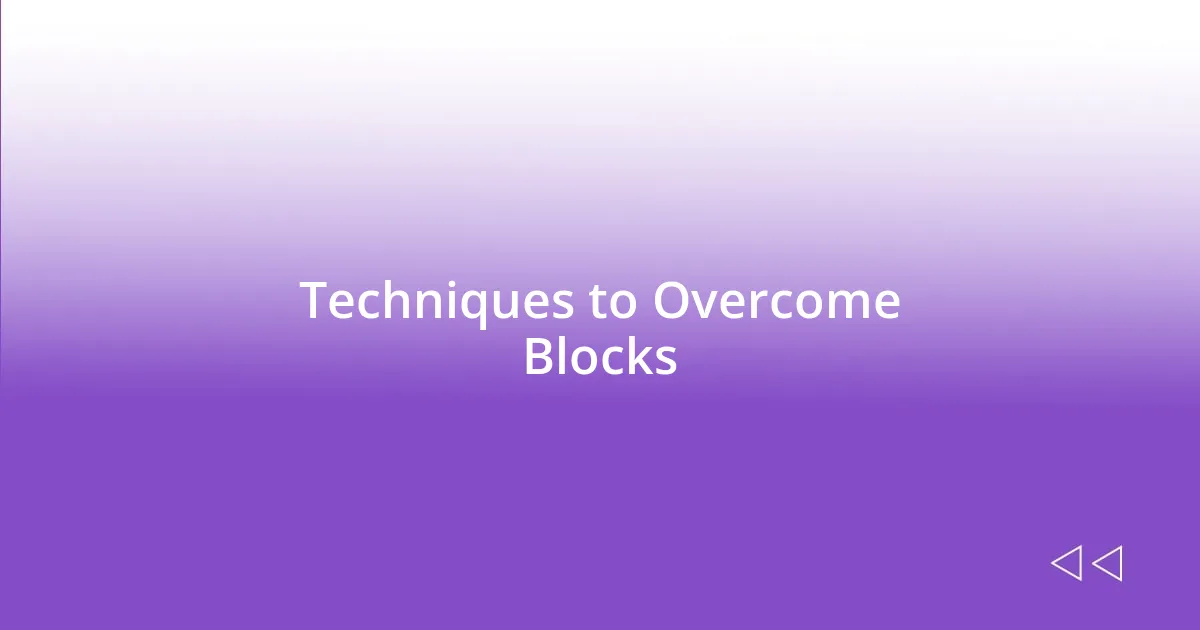
Techniques to Overcome Blocks
Sometimes, the simplest techniques can make a big difference in overcoming creative blocks. One approach that I frequently use is setting a timer for short bursts of focused work. When I feel a block coming on, I commit to just 10 minutes of creation. This technique lowers the pressure and often unlocks a flow I didn’t think I had. Have you ever noticed how a ticking clock can push you to action rather than fretting about the final product?
Another method that has worked wonders for me is changing my environment. A fresh perspective can do wonders for creativity. I’ve experienced moments where a walk in the park or a visit to a cozy café sparked ideas that had been trapped in my mind. It’s fascinating how new sights and sounds can inspire and invigorate our thoughts, don’t you think?
Lastly, I’ve found that engaging in creative hobbies outside my primary focus helps break down mental barriers. For instance, I picked up journaling to explore my thoughts without the pressure of creating something “worthy.” This stress-free form of expression often leads me back to my main project with renewed enthusiasm. It’s a reminder that creativity isn’t just about producing art but also about nurturing the soul behind it.
| Technique | Description |
|---|---|
| Timed Work Sessions | Set a timer for a brief, focused session to ease the pressure and stimulate creativity. |
| Environment Change | Switch your surroundings to gain new perspectives and inspiration. |
| Creative Hobbies | Engage in other creative activities to refresh your mind and reignite your passion. |
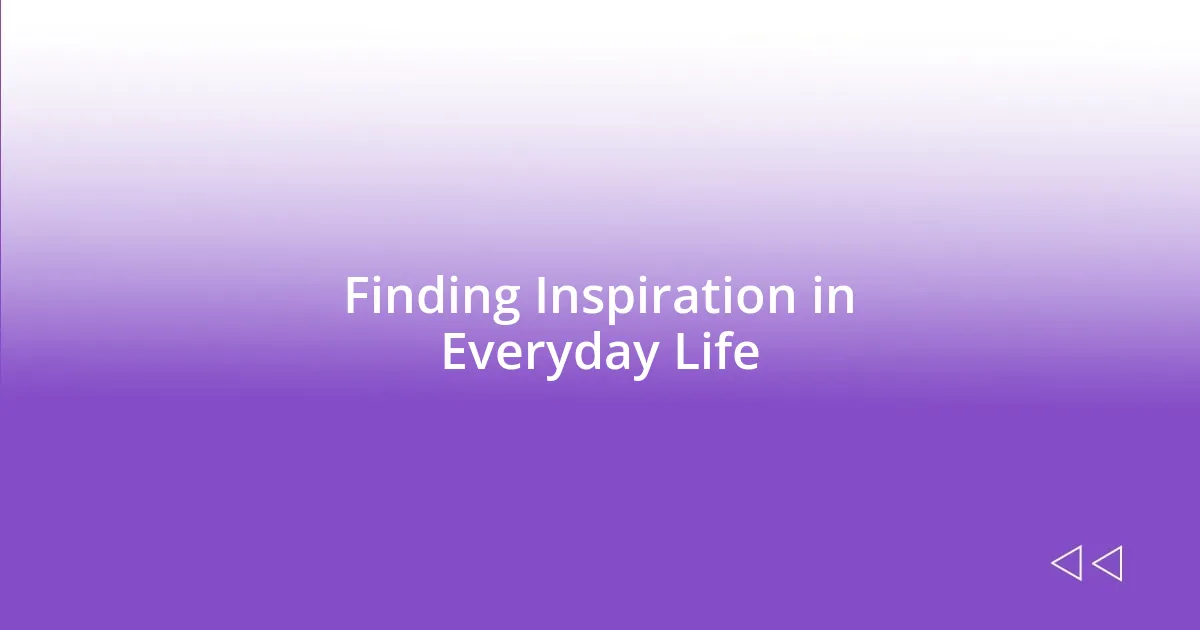
Finding Inspiration in Everyday Life
Finding inspiration in everyday life can be surprisingly simple if you know where to look. I often find that the most mundane moments—like my morning coffee routine—spark the best ideas. One day, while waiting for my coffee to brew, I noticed the playful dance of steam rising from the cup. That moment led to a poem I later crafted, capturing the beauty of fleeting moments. Have you ever noticed how something as ordinary as a cup of coffee can awaken creativity?
Taking a stroll through my neighborhood has also become a rich source of inspiration. On one of my walks, I spotted children playing in a park, their laughter echoing like music against the backdrop of trees. It reminded me of my own childhood, a wealth of memories bursting with imagination. I found myself jotting down snippets of those feelings, wondering how childhood play still lingers in our adult lives and fuels our creativity. Isn’t it fascinating how those small, joyful moments can echo throughout our creative processes?
I believe there’s magic in storytelling, especially when we draw from our own experiences. During a mundane grocery shopping trip, I overheard a touching conversation between two strangers, which sparked a new short story idea for me. That fleeting moment highlighted the importance of listening and being present in our daily lives. Have you ever thought about how the world around us is a tapestry of stories just waiting to be told?
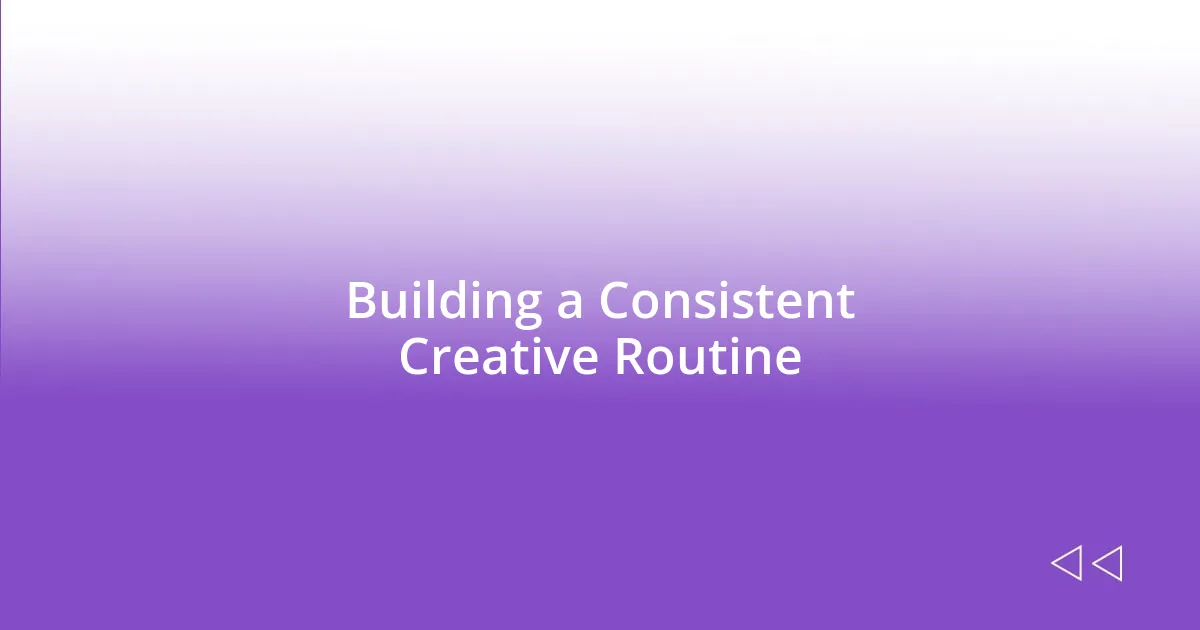
Building a Consistent Creative Routine
Creating a consistent creative routine can feel daunting at first, but I’ve discovered that small rituals make it manageable. When I wake up, I dedicate the first 30 minutes of my day to free writing. This unstructured time allows my thoughts to spill onto the page without judgment. Have you ever noticed how those early morning moments can set the tone for the rest of your day?
Another aspect of consistency is finding the right time that works for you. I’ve experimented with different times of day and found that late afternoons often yield my best ideas. It’s during these hours that I feel a surge of energy and clarity, almost like my brain has warmed up. If you haven’t identified your creative peak times, I encourage you to try different schedules until something clicks.
Ultimately, accountability can be a game-changer. I joined a local writing group that meets weekly, and it has been transformative. Sharing my progress with others keeps me motivated and committed. I cherish those moments when we exchange ideas and uplift one another. Isn’t it amazing how community can nurture our creativity and make the journey feel less lonely?
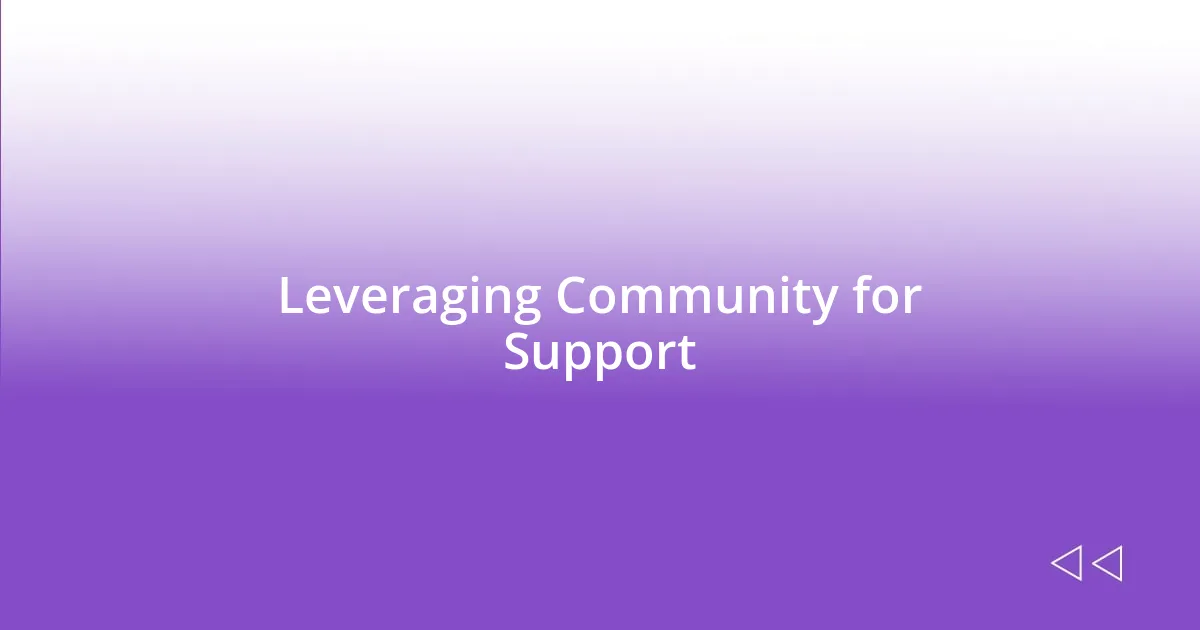
Leveraging Community for Support
Finding a supportive community has been a lifeline for me when facing creative blocks. I remember attending a local art workshop where I met fellow artists who shared their struggles. Listening to their stories made me realize I wasn’t alone in this battle—suddenly, my feelings of isolation began to dissipate. Have you ever found that connection with someone who truly understands where you’re coming from?
I’ve also tapped into online forums and social media groups dedicated to creative expression. One evening, I shared a project that had me stumped, and the flood of encouraging comments and constructive feedback was exhilarating. The diversity of perspectives not only rejuvenated my creativity but also filled me with inspiration to push through my block. Isn’t it incredible how a few thoughtful words from others can reignite our passion?
Participating in community events, like writing challenges or collaborative projects, has proven immensely beneficial for me as well. There was a month-long poetry challenge that linked me with other aspiring poets, and each prompt felt like a gentle nudge to explore new ideas. Engaging with others helped me see my work in a new light, reminding me that creativity often thrives in shared spaces. How has your experience with community shaped your creative journey?
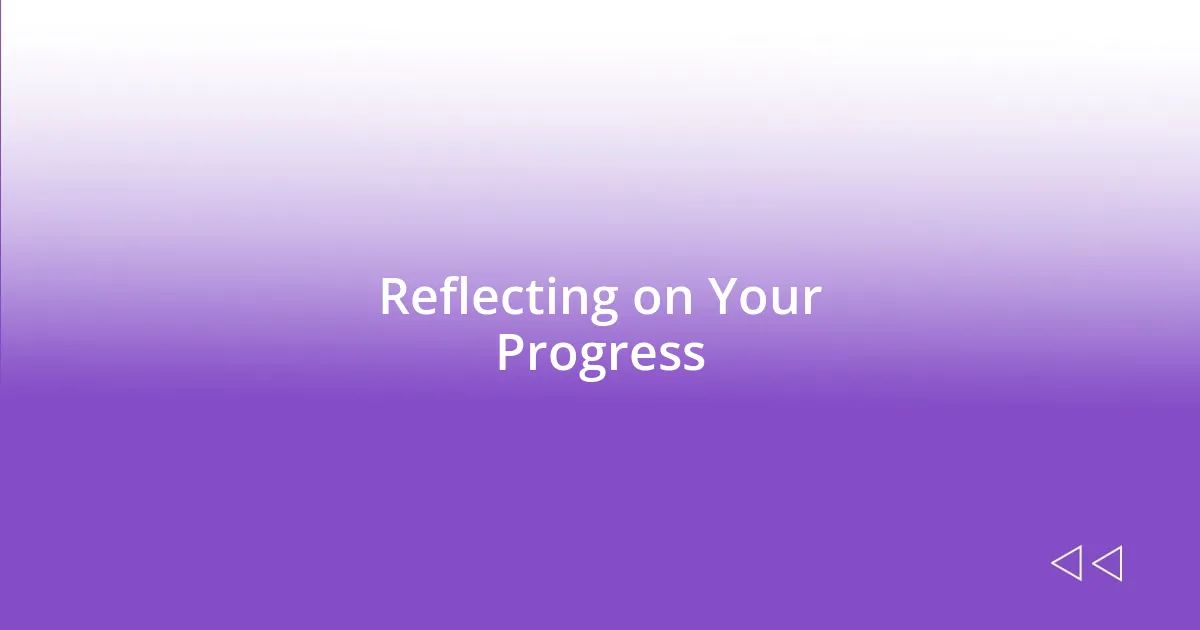
Reflecting on Your Progress
Reflecting on my progress has become an essential part of my creative journey. When I take a moment to review the pieces I’ve created over the months, I’m often surprised by how far I’ve come. It’s like holding a mirror to my growth; I can see the evolution not just in my work but in my confidence as well. Have you ever looked back at your earlier creations and felt a sense of pride?
I remember a time when I felt stagnant, doubting every word I put down. It was disheartening, yet I chose to revisit my past projects. As I flipped through those pages, I felt a rush of nostalgia mixed with enlightenment. I could see patterns in my creativity, the themes that resonated with me, and those that sparked joy. This retrospective exercise taught me valuable lessons about persistence and adaptation. Isn’t it fascinating how our earlier struggles can illuminate the path forward?
Sometimes, I set specific milestones to track my progress more effectively. For instance, after finishing a writing piece, I jot down what worked, what didn’t, and how I felt during the process. This simple method of journaling allows me to stay connected with my creative process. It’s empowering to acknowledge my achievements, no matter how small. How do you keep track of your creative milestones?





